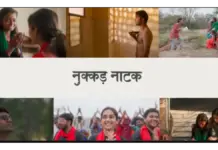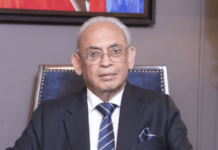Touchwood Multimedia Creations’ Hamne Gandhi Ko Maar Diya is the story of communal disharmony and about a family misunderstanding, set in post-Independence India, around 1948.
Kailash (Jatin Goswami) and his wife, Sudha (Samiksha Bhatnagar), have gotten married against the wishes of Kailash’s mother, Savitri (Pratima Kannan). This, and Kailash moving away to the city have created a rift between mother and son. Kailash and Sudha have a little daughter, Munni (baby Utkarshika Yadav). The three are on their way to Kailash’s village to meet his mother with whom they had had a fallout soon after their marriage. In fact, Kailash had left the property papers and jewellery given by his fair-minded mother to them, because she was not happy with his decision to leave her alone in the village just as she was critical of his love marriage. Years had passed by.
In their two-day train journey to the village, Kailash and Sudha meet different people and get talking about communal disharmony which has created a huge divide between two communities in particular. There are moments of tension as an old man is sought to be thrown out of the train by co-passengers who are members of one community and fear that the old man belongs to the other community. But the man turns out to be from their own community and so peace is soon restored. Kailash is particularly critical of the other community but co-passenger Diwakar (Subrat Dutta) is more tolerant. Kailash faces embarrassment when a person of the other community saves his (Kailash’s) little daughter when she falls from the train.
Back home, Kailash and Sudha are shocked to learn that their mother has passed away. Communal violence had taken its toll on their mother’s life because she had given shelter to members of the other community during communal riots in the village. Kailash’s mother, unlike him, had been a proponent of the Gandhian philosophy of love, peace, tolerance and non-violence. In fact, Kailash realises that he had hated Gandhiji without any solid reason – and he realises this when he reaches his village, when Gandhiji has just been assassinated. On their personal front, Kailash and Sudha are devastated on learning from neighbour Vimla (Shabih Jafri) that Kailash’s mother had written him several letters, asking him to come visiting, but all the letters had been returned undelivered as Kailash had shifted residence in the city.
Naeem A. Siddiqui’s story is confused and the juxtapositioning of the larger picture with the family drama of Kailash doesn’t really go well. Why Kailash is so bitter about Mahatma Gandhi and his philosophy is not too clear. One would have thought that he would become bitter after knowing that his mother had become a victim of communal riots but he is shown to be bitter before he learns of the news of his mother’s killing in communal riots. And once he learns that his mother had died only because of communal tension, he stops being communal-minded! That seems a bit far-fetched, never mind even if persons from her own community had killed her. Frankly, Naeem A. Siddiqui’s story is so fragmented that it simply fails to create any impact. Sanjay Rai’s screenplay also doesn’t help. It moves at a very slow pace and bores the audience. The train journey gets so monotonous that the viewer feels like either pulling the chain to stop the train or killing himself under the moving train! Dialogues, written by Sanjay Rai, are routine except for a few mouthed by Savitri.
Jatin Goswami does an average job as Kailash. Samiksha Bhatnagar is quite expressive in the role of Sudha. Subrat Dutta is earnest as Diwakar. Pratima Kannan lends good support as Savitri. Shabih Jafri provides routine support as neighbour Vimla. Baby Utkarshika Yadav is so-so. Azad Mishra (as Maiku Chacha), Manoj Verma (as Gopal Chaubey), Amlesh Jaiswal (as Virendra), Rakesh Dubey (as Narendra), Raju Pandey (as Gaurishankar), Emran Khan (as Vanshidhar), Zia Khan (as Awdhesh) and Kiritika Budden (as Mumtaz) lend routine support.
Naeem A. Siddiqui’s direction is weak. His narrative style, like his story, holds appeal for the festival circuit audience only. Anjali Kumar Tiwari’s music is ordinary. Anup Bhat’s background music hardly adds anything to the drama. Camerawork (by Shanti Bhushan Roy) is alright. Ratan Suryavanshi’s art direction is average. Nil esh Mulye’s editing ought to have been sharper.
On the whole, Hamne Gandhi Ko Maar Diya has almost nil commercial prospects.




























